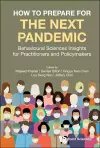
How To Prepare For The Next Pandemic: Behavioural Sciences Insights For Practitioners And Policymakers
5 contributors - Hardback
£55.00
Dr Majeed KHADER is the Director of the Home Team Behavioural Sciences Centre under the Ministry of Home Affairs (MHA), Singapore. Dr Majeed is also the Chief Psychologist of the MHA. A trained hostage negotiator, his previous operational duties include being the Deputy Commander of the Crisis Negotiation Unit and a trainer with the negotiation unit. He teaches criminal psychology as an Assistant Professor (Adjunct) at the School of Social Sciences at Nanyang Technology University (NTU), Singapore. For the past 26 years, Majeed has overseen the development of psychological services in the areas of stress, resilience, employee selection, deception psychology, leadership, crisis negotiations, crime profiling, and crisis psychology. For his work, he was awarded the National Day Public Administration Award (Bronze) in 2006 by the President of Singapore, and once again the Public Administration Award Silver in 2014. A pioneer forensic psychologist, Majeed holds a Master's degree (with Distinction) in Forensic Psychology from the University of Leicester (United Kingdom), and a PhD in Psychology (specialising in personality and crisis leadership) from the University of Aberdeen, Scotland. Majeed has been invited as a speaker to organisations in Indonesia, Malaysia, Japan, Canada, Hong Kong, United Kingdom, and the United States to share on crime psychology, terrorism, and leadership. He has also presented at the FBI, NCIS, and the RCMP. He has been the Chairman of the Asian Conference of Criminal and Operations Psychology thrice. He is the Asian Director of the United States-based Society of Police and Criminal Psychology, and a member of the Asia Pacific Association of Threat Assessment Professionals. He is a Registered Psychologist with the Singapore Psychological Society (SPS), and a member of the British, and American Psychological Societies. He has contributed to several book chapters and published widely in peer-reviewed journal such as Journal of Research in Personality, Journal of Occupational Health Psychology, Psychology & Health, Cognition and Emotion, International Journal of Psychophysiology, Personality and Individual Differences, International Journal of Police Science & Management, Journal of Police and Criminal Psychology, and Security Journal. Dr Denise Dillon is an academic living and working in Singapore, at James Cook University. In 2020, she led a research team on national and international survey-based research to study the psychosocial effects of COVID-19. An environmental psychologist by training, Dr Dillon is also a literary critic by heart, and she publishes in the field of ecocriticism as well as in her specific areas of research interest, in environmental psychology and biophilia. Dr Dillon is a member of the Singapore Psychological Society (SPS) Council, and currently holds the position of Research Chair. Xingyu Ken Chen is a Senior Behavioural Sciences Research Analyst at the Home Team Behavioural Sciences Centre, Ministry of Home Affairs (MHA), Singapore. Some of his other writings include psychological vulnerabilities to fake news in the aftermath of a terror attack in Learning from Violent Extremist Attacks: Behavioural Sciences Insights for Practitioners and Policymakers (2018), the intersection of crime and fake news in Encyclopaedia of Criminal Activities and the Deep Web. His current research interests include online misinformation, information operations, strategic communications, and natural language processing. Loo Seng Neo is a Principal Behavioural Sciences Research Analyst with the Home Team Behavioural Sciences Centre at the Ministry of Home Affairs (MHA), Singapore. For the past 13 years, Loo Seng has been leading a team of research analysts and interns to research on emergent trends on terrorism, resilience, misinformation, and intergroup conflict, and distilling useful insights for the ministry through research reports and training for law enforcement officers. He has also trained grassroots leaders and the general public about the threat of terrorism and how to prepare for the 'day after' terror. Based on his research, Loo Seng has presented at many international conferences and published many peer-reviewed journals and book chapters. He has also co-edited several books. He is currently pursuing his PhD in psychology at the Nanyang Technological University (NTU), Singapore, where he attempts to identify person-centric, psychosocial, and protective factors that can identify markers of radicalisation in social media posts. In his spare time, he mentors psychology undergraduates from the local universities. Jeffery Chin has been a staff psychologist with the Home Team Behavioural Sciences Centre (HTBSC) since 2006. Incepted in 2006, the HTBSC is an applied behavioural sciences research, training and operational support unit in the Ministry of Home Affairs (MHA), Singapore. One of the Centre's key remit is to translate knowledge from the field of psychology and the behavioural sciences into operational knowledge that law enforcement, safety, security, and correctional agencies under the auspices of MHA may utilise or incorporate into their policies, operations, and practice. As one of the pioneers at the HTBSC, Jeffery played an important role in setting up the unit in its initial years, and oversaw its development from a programme (the Behavioural Sciences Programme) in 2006 to a full-fledged psychological research and training centre (the Home Team Behavioural Sciences Centre) presently. He has been involved in roles and projects across several domains that supported the operations and development of Singapore law enforcement and security officers over the years. The roles and projects include crime and investigation support research, training and consultation, crisis intervention and resilience management, crisis negotiation operations, and leadership development and assessment.